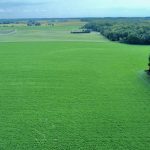Canadians who have led the world’s largest french fry processor on tours through their potato-growing regions are nice, interesting and informative.
But that’s about the extent of what a spokesperson for Lamb Weston, a subsidiary of ConAgra, would say about the company’s plans involving a much-rumored potato processing plant in Western Canada.
“There’s a lot of land,” said Andy Brassington, from the company’s headquarters in the Tri-Cities area of south-central Washington state.
Officials have visited “a great many places in at least three different provinces,” said Brassington.
Read Also

Canadian-bred cow wins World Dairy Expo Holstein show
A cow bred in Saskatchewan, Lovhill Sidekick Kandy Cane, is the Grand Champion Holstein at the 2025 World Dairy Expo.
“We’re just basically exploring the different regions and different provinces of Canada, so we can understand what is available from a raw product, production point of view.”
The company does this kind of exploration all the time, he said.
But he refused to elaborate on what the pros and cons of setting up a french fry plant in Canada might be, “because that gets to the heart of a basic business decision.
“We keep our business plans to ourself,” he explained.
“I know you’d like to hear more but I’m just not at liberty to discuss whether we’re planning to do something … and if so, where, and if so, when.”
Manitoba’s super-sized fries business has made big inroads into U.S. markets in the last few years. Lamb Weston’s main competitors, McCain, Simplot and NestlŽ, all have interests in Manitoba plants.
Alberta and Saskatchewan have also been promoting their irrigated regions.
While Alberta government officials won’t confirm whether Lamb Weston has visited the province, representatives of Saskatchewan’s Spudco admit the company has been poking around.
Industry analysts say cheap land and currency help Canadian potatoes in the U.S. market, but the North American industry has too much capacity now to make building another plant worthwhile.














